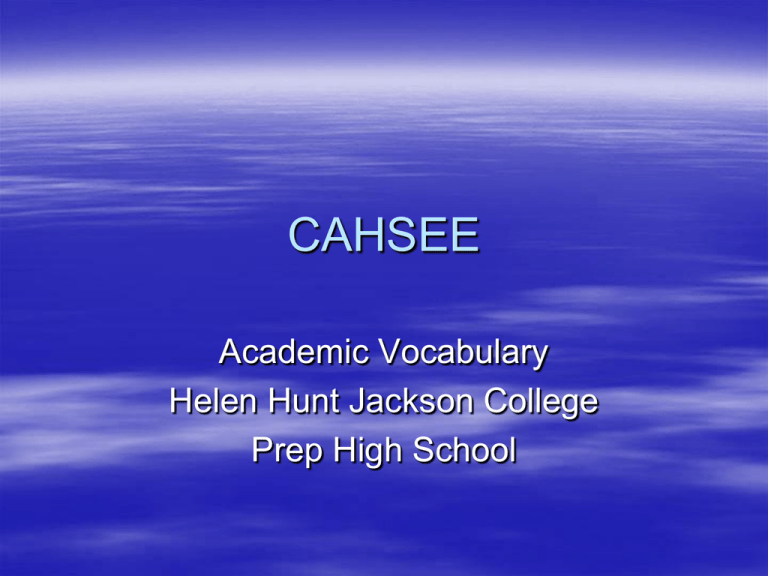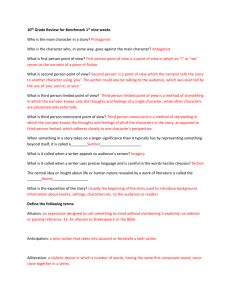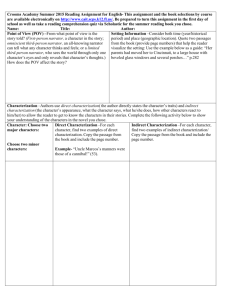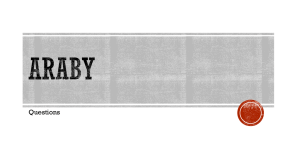WVHS English/Language Arts
advertisement

CAHSEE Academic Vocabulary Helen Hunt Jackson College Prep High School Academic Vocabulary #1 CONTROLLING IMPRESSION EX: Thesis; main idea The central impression or idea a writer aims to communicate Academic Vocabulary #2 Essay EX: intro paragraph, 2-3 body paragraphs, concluding paragraph A short piece of non-fiction writing with a thesis statement Academic Vocabulary #3 REVISE EX: Rough Draft, Final Draft To make changes and improve writing based on content, organization, style, and purpose Academic Vocabulary #4 Evidence EX: examples, elaboration Support for an idea Academic Vocabulary #5 Setting EX: A rooftop in Dublin during the Civil War (“The Sniper”) Where and when a story takes place Academic Vocabulary #6 Chronological Order The order, from 1st to last, in which events take place. EX: First, I … Then,… Next… Finally… Academic Vocabulary #7 Cause & Effect EX: Mrs. Hyde gets no Diet Coke in the morning, therefore she is grumpy. Students get a 6-page test and fail. Parents yell at kids for failing test. Students get Mrs. Hyde a Diet Coke. Everyone gets an ‘A’. Organization to show the reasons for and results of something Academic Vocabulary #8 EXTERNAL CONFLICT EX: Man v. man (Capulet v. Montague) or Man v. nature (Mrs. Hyde v. The Skunk) A struggle or opposition caused by an outside force Academic Vocabulary #9 Internal Conflict EX: Fear of heights, being in love with your best friend’s girlfriend A struggle within oneself Academic Vocabulary #10 Plot EX: Romeo & Juliet, who are supposed to be sworn enemies, fall in love, get married and die. The series of related events that make up a story. Academic Vocabulary #11 Exposition EX: In “Contents” Clare goes to the movies and the paper flies out the window. The beginning part of the story that introduces the characters, gives the setting, and introduces the conflict(s). Academic Vocabulary #12 Rising Action Tom is stuck out on the ledge and tries various ways to get to safety. This part of the story begins to develop the conflict(s). Academic Vocabulary #13 CLIMAX EX: When Jack saves Rose and sacrifices himself in Titanic The most exciting or high point of the story Academic Vocabulary #14 The end of a story, Falling when the conflict is Action/Resolution resolved and loose ends are tied up EX: They all live happily ever after! Academic Vocabulary #15 PROTAGONIST EX: Timmy Turner, from The Fairly Odd Parents The main character in a story. Academic Vocabulary #16 Antagonist Example: Scar, from The Lion King Any bad guy or villain in a book or movie A character who opposes the protagonist’s efforts Academic Vocabulary #17 Foreshadowing In The Hunger Games, Peeta picked poison berries, thinking they were edible, and Kat put a couple in her pocket just in case she might need to use them on another contestant later. Hints or clues to the outcome of the action in a story. Academic Vocabulary #18 Flashback EX: In The Outsiders, when Ponyboy is dreaming and remembering how things used to be when his parents were around A scene that looks back at events from an earlier time Academic Vocabulary #19 Flash-forward EX: As a father is holding his newborn baby, he imagines walking her down the aisle at her wedding. A scene that jumps ahead to events in the future. Academic Vocabulary #20 Theme EX: Good wins over evil (theme of most superhero cartoons) An author’s overall message about life or human nature that is revealed in a work of literature. Academic Vocabulary #23 Suspense EX: Wondering when the killer will strike while watching a scary movie. The excitement or tension that builds in a story; makes the reader want to know what will happen next. Academic Vocabulary #21 Characterization By using actions and dialogue The way a writer reveals how characters think, feel, and act Academic Vocabulary #22 Direct Characterization EX: Maggie was shy. The writer describes the characterization directly Academic Vocabulary #23 Indirect Characterization EX: Maggie would not look up and spoke in a whisper. Readers must figure out the characterization Academic Vocabulary #24 Dynamic Character EX: Tom from “Contents of the Dead Man’s Pocket” A character who changes in a dramatic way during a story Academic Vocabulary #25 Static Character EX: Clare, from “Contents of the Dead Man’s Pocket” A character who remains the same during a story. Academic Vocabulary #26 Stock Character EX: the nutty professor A one-sided character who represents specific, familiar types Academic Vocabulary #27 Flat Character EX: Shaggy from Scooby Doo A character with only one or two personality traits Academic Vocabulary #28 Round Character EX: Harry Potter, Anakin Skywalker One who is complex, with many personality traits. Academic Vocabulary #29 Dramatic Monologue Juliet: 'Tybalt is dead, and Romeo--banishèd!' That 'banishèd,' that one word 'banishèd,' Hath slain ten thousand Tybalts. A long speech made by one character to one or more other characters Academic Vocabulary #30 Dialogue “How do you pronounce this name?” (Mama) “You don’t have to call me by it if you don’t want to” (Dee/Wangero) Conversation between characters Academic Vocabulary #31 Soliloquy "Well, Juliet, I will lie with thee tonight" (Romeo, in 5,1) A speech given by a character alone Academic Vocabulary #32 Paraphrase The air was cool and the ground was frozen. = It was cold outside. Restating information in your own words approximately the same length as the original Academic Vocabulary #33 Direct Quote “Most employers require a candidate to have a bachelor’s degree in accounting or a related field” (Bureau of Labor Statistics). To use the exact words from a source, giving credit to that source. Academic Vocabulary #34 Summarize The team gave a valiant effort, but came up short. = They lost. Restating only the main ideas of a source in your own words. Academic Vocabulary #35 Elaboration In SUTW, the ‘red’ stop/explains support the ‘yellow’ star ideas The addition or extension of ideas to support ideas already presented Academic Vocabulary #36 Parenthetical Citations Used to document any external sources used within a research report “Most employers require a candidate to have a bachelor’s degree in accounting or a related field” (Bureau of Labor Statistics 1). (Smith 49). Academic Vocabulary #37 Works Cited Jones, Nick. How to Become a Photographer. Boston: Little, Brown, & Company, 1993 A separate page of the research essay that lists sources used within the report. Academic Vocabulary #38 Synthesis or synthesize Both Brown and Jones state that….. The merging of information gathered from more than one source. Academic Vocabulary #39 Primary Source EX: diaries, letters, autobiographies An information source with direct participation with the subject (first hand knowledge) Academic Vocabulary #40 Secondary Source EX: Textbooks, encyclopedias, most newspaper/ magazine articles. An information source by someone who did not participate in or observe the events. Academic Vocabulary #41 POINT OF VIEW EX: “I was about to fall asleep when I heard a terrible scream.” (1st person) The vantage point, or perspective, from which a writer tells a story. Academic Vocabulary #42 FIRST PERSON POINT OF VIEW (or first person narrator) EX: “The next thing I knew, I was waking up in the hospital.” When the narrator is a character in the story, using the “I” voice Academic Vocabulary #43 Omniscient point of view EX: Startled, he looked down, cocking his head to one side and watching with great interest while the man rattled the blades of grass as he tried to hide himself behind the tree. All-knowing narrator; can see into the hearts and minds of more than one character Academic Vocabulary #44 Third person limited point of view As she walked, she realized it was just too quiet. Narrator knows only the thoughts and feelings of one character Academic Vocabulary #45 Narrator EX: John from “By the Waters of Babylon” The person telling the story Academic Vocabulary #46 Tone EX: “It is forbidden to go to any of the Dead Places. The author’s attitude toward his or her subject, shown through diction and voice Academic Vocabulary #47 Credibility Not credible=John from “By the Waters of Babylon” Credible=Occupational Outlook Handbook The believability or reliability of the information given Academic Vocabulary #48 Voice “Yo baby, what up?” “Good day. How are you fairing this fine afternoon?” An author’s special style set up through diction and tone Academic Vocabulary #49 Persona Narrator (1st or 3rd person) The voice or character an author chooses to narrate a story Academic Vocabulary #50 Motivation EX: In “Cold Equations,” the stowaway is motivated by a desire to see her brother. The reasons why a character acts or thinks in a certain way. Academic Vocabulary #51 Figurative Language “He’s such a dream!” “The toast jumped out of the toaster.” Words used in imaginative ways to expand their meaning and impact Academic Vocabulary #52 Simile A comparison of two unlike things using ‘like’ or ‘as’ or ‘resembles’ Alex is like a ray of sunshine! A= Academic Vocabulary #53 Metaphor A comparison of two unlike things, not using ‘like’ or ‘as’ Sebastian is a beautiful rose S= Academic Vocabulary #54 Personification “My stapler must have gotten up and walked away!” Giving human qualities to inhuman things such as animals or objects Academic Vocabulary #55 Parallel Structure EX: At the beach, the girls love tanning, swimming, and talking. Joining several related ideas in a sentence in a similar way. Academic Vocabulary #56 Imagery EX: (After ApplePicking) - the rumbling .. of load on load of apples coming in. Descriptive language that creates vivid “word pictures” to appeal to the senses. Academic Vocabulary #57 Diction “A smile crept up on Jonathon’s face as he realized this house was his home.” A writer’s careful selection of words to create a desired effect Academic Vocabulary #58 Connotation I may live in a house, but it feels like home! A word’s emotional connections Academic Vocabulary #59 Literal Meaning (aka Denotation) EX: Chair=piece of furniture to sit on. The precise, dictionary definition of a word or phrase Academic Vocabulary #61 Interior Monologue EX: “I wish I were cool enough to hang out with Brian Huerta and his friends,” the new kid thought sadly. A character’s inner thoughts and feelings. Academic Vocabulary #62 EXPOSITORY EX: a science textbook, a cookbook, an essay about 3 causes of the Civil War. Writing that provides information or explains something about a topic Just the facts! Academic Vocabulary #63 SENTENCE STRUCTURE (aka SYNTAX) Ice melts. The ice melts quickly. The ice on the river melts quickly under the warm March sun. Lying exposed without its blanket of snow, the ice on the river melts quickly under the warm March sun. The way words are put together to create a writing style. Academic Vocabulary #60 Consumer Documents Car warranty Directions on how to assemble a bookshelf Texts that provide information about products and services. Academic Vocabulary #61 Workplace Documents EX: contracts, business letters, emails, memos Documents used in the workplace to communicate information. Academic Vocabulary #62 Public Documents EX: Newspapers, bus schedules, government regulations Documents that inform the public Academic Vocabulary #64 Technical Documents Windows for Dummies Instruction booklets Documents used to explain procedures for using technology. Academic Vocabulary #65 Functional Documents EX: Consumer, public, workplace, and technical documents. Any documents prepared for a specific function. Academic Vocabulary #66 Boldface I like to put important words in boldface type. Dark, heavy type. Academic Vocabulary #67 Format EX: bullet points, numbering, headings, margins The design of a document Academic Vocabulary #68 Graphics Visual elements that add to the text EX: art, photos, drawings, diagrams 100% 80% 60% 40% 20% 0% Series 3 Series 2 Series 1 Academic Vocabulary #69 Header Before You Read – Terms to Know: A label or heading that begins a section of a document. Academic Vocabulary #70 Point-by-point Sequence A sequence that lists items in no particular order. EX: our list of academic vocabulary terms Tone Symbol Irony Academic Vocabulary #71 Step-by-step sequence A sequence that tells you what to do first, second, third, and so on. EX: a recipe 1. Get out ingredients 2. Mix butter and sugar Academic Vocabulary #72 Situational Irony EX: You expect to get presents at Christmas, and you end up with coal in your stocking When you expect one thing to happen, but something totally different occurs Academic Vocabulary #73 Verbal Irony EX: “You’re my Favorite class!” When you say one thing, but mean something totally different Academic Vocabulary #74 Dramatic Irony EX: Romeo & Juliet When the reader or audience knows something that a character does not know Academic Vocabulary #75 Ambiguity “The Lady or the Tiger?” An uncertain interpretation; lack of precise meaning; unclear Academic Vocabulary #76 Objective Writing Encyclopedia articles When a writer includes only the facts Academic Vocabulary #77 Subjective Writing R.M.S. Titanic: “She was a deadly reality, this ghastly thing.” When the writer adds his/her opinions, judgments, feelings Academic Vocabulary #78 Tragedy EX: Romeo & Juliet, Julius Caesar A play with tragic events that usually end in death Academic Vocabulary #79 Acts/Scenes Ex: Act I, scene i Plays are divided into sections, or acts; acts are divided into shorter sections, or scenes Academic Vocabulary #80 Drama Julius Caesar Literature in play form, meant to be acted for an audience Academic Vocabulary #81 Foil Brutus and Cassius A character that serves to contrast the traits of the main character Academic Vocabulary #82 Comedy Midsummer Night’s Dream A play with humorous events that ends happily Academic Vocabulary #83 Aside Trebonius: “..so near will I be that your best friends will wish I had been further.” A short speech, delivered to the audience or to another character, that others onstage are not supposed to hear. Academic Vocabulary #84 Tragic Hero EX: Caesar? Brutus? An admirable figure who has a personal failing that leads to his or her downfall. Academic Vocabulary #85 Tragic Flaw Caesar’s ego? A failing that leads a character to make choices that result in tragedy. Academic Vocabulary #14 ANTONYMS EX: Hot/Cold Big/Small Dark/Light Words that have the opposite or nearly opposite meanings. Academic Vocabulary #16 PERSUASIVE EX: MLK’s “I Have a Dream” speech An essay or speech that seeks to persuade/convince others to do or believe something Academic Vocabulary #19 ARGUMENT EX: any television ad or radio commercial. – “You’re in good hands with Allstate!” A series of statements designed to persuade readers to accept a claim or opinion Academic Vocabulary #20 Drafting EX: 1st draft, 2nd draft, Final Draft Writing in its initial/beginning stages Academic Vocabulary #21 ORGANIZATION The arrangement of ideas and information EX: outline, SUTW format I. Literary Terms A. Foreshadowing 1. Hints or clues B. Flashback Academic Vocabulary #28 Anecdote EX: The anecdote of Hyde being sprayed by a skunk to illustrate conflict A very brief, often witty story that makes a point Academic Vocabulary #31 Idiom EX: It’s raining cats and dogs! A special expression that not meant to be taken literally Academic Vocabulary #95 MOOD “Her species must be eradicated..” A story’s atmosphere or the feeling it evokes in the reader Academic Vocabulary #98 Allegory EX: Animal Farm A story where characters and settings stand for moral qualities or ideas. Academic Vocabulary #96 Symbolism Lion=royalty or fearlessness Owl=wisdom or bad luck When one thing represents something else



